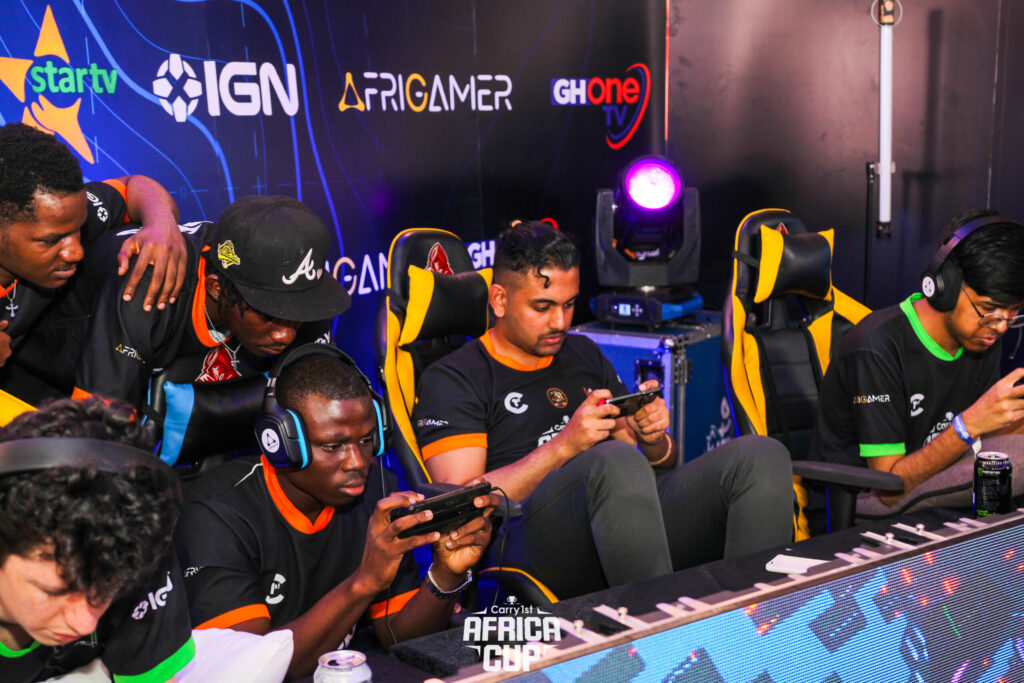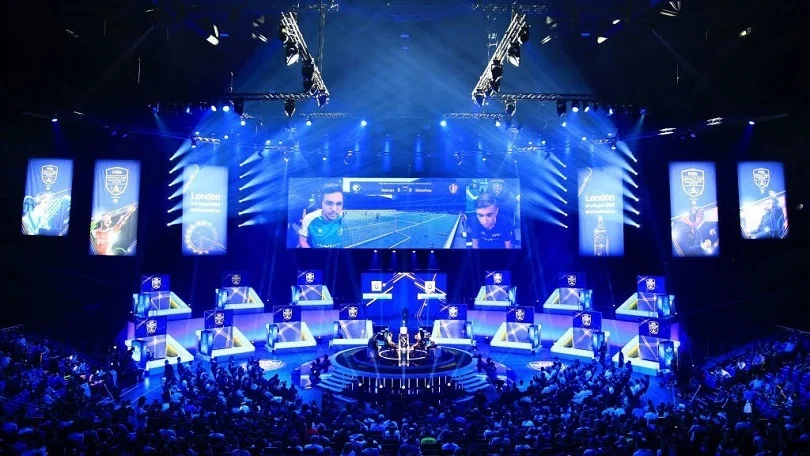If you still think gaming is just child’s play, it’s time to hit pause and rethink that. What used to be a casual hobby is now one of the fastest-growing career paths for creativity, influence, and income.
In 2024, Nigeria’s gaming industry pulled in a whopping US$300 million in gaming revenue, officially cementing its spot as Africa’s second-largest gaming market, right after Egypt.
And guess what’s leading the charge? Mobile gaming, accounting for a massive 89% of that revenue. These days, gaming in Nigeria has grown far beyond just passing time or having fun. People now play to win, connect with others, and even make money from their skills.
If you often find yourself spending hours perfecting your moves, learning new strategies, or defeating opponents online, here’s something exciting that passion of yours could actually turn into a career.
Yes, it’s possible to become a professional gamer, but it’s not as easy as it looks. Behind every big win or viral moment are countless hours of practice, late-night gaming sessions, and lots of learning. It takes patience, focus, and a real love for the game.

What Exactly Is a Gaming Career?
A gaming career simply means earning money through video games. You can make money in different ways from sponsorship deals and brand partnerships to winning tournaments, streaming your gameplay online, or even creating gaming content for YouTube and TikTok.
The gaming world has become a full industry of its own, and it’s not just about playing games anymore.
There are many roles behind the scenes like game developers, testers, commentators (also called shoutcasters), event organizers, coaches, and analysts.
All of them play a part in growing the gaming and esports space. For professional players, gaming can mean long hours, unpredictable schedules, and constant competition, sometimes even joining tournaments from their own rooms.
But for many who stay committed, gaming becomes more than a hobby. It’s a lifestyle filled with creativity, teamwork, and endless opportunities to grow.
Types of gaming careers
There’s more than one way to turn your love for gaming into a career. Whether you’re a competitive player, a storyteller, or someone who enjoys building things behind the scenes, the gaming world has a spot for you.
Let’s break down some of the most exciting career paths you can explore.
1. Esports: Compete and Conquer
Esports: short for electronic sports is all about competitive gaming. Here, players go head-to-head in tournaments watched by thousands (sometimes millions!) of fans online.
These competitions often come with huge cash prizes, sponsorships, and global recognition. But esports isn’t just about the players the industry runs on a full support team.
You can also build a career as an analyst, coach, shoutcaster (commentator), event organizer, or even a content strategist working behind the scenes to make tournaments shine.

2. Game Development: The Architects of Imagination
If you’ve ever wondered who creates the worlds, characters, and stories you love, this is where the magic happens. Game development brings together programmers, artists, designers, writers, and sound engineers to build the games we can’t stop playing.
- Game Designers craft the gameplay mechanics and rules.
- Developers/Programmers write the code that powers it all.
- Animators and 3D Artists bring characters and environments to life.
- Writers build the storylines and dialogues that keep us hooked.
Did you know? According to Glassdoor, the average salary for a game developer ranges from $60,000 to $120,000 per year, depending on skill and experience. In larger studios like Ubisoft or Riot Games, senior developers can make even more.
3. Game Streaming and Content Creation: Build Your Own Brand
This is one of the fastest-growing careers in gaming today. Platforms like Twitch, YouTube Gaming, and Kick have turned passionate players into full-time entertainers and influencers.
If you love engaging with an audience, reviewing games, or showcasing your skills, this could be your lane. The key is consistency, authenticity, and community building. You can earn from ads, sponsorships, donations, and affiliate links.
4. Game Testing and QA: Play with Purpose
Imagine being paid to play games before anyone else. Game testers, also called Quality Assurance (QA) specialists, are responsible for identifying bugs, glitches, and gameplay issues before a game hits the market.
It’s not just fun and games, though, it requires patience, attention to detail, and solid communication skills to report problems clearly to developers.

5. Gaming Journalism and Marketing: The Voice of the Industry
If you’re good with words and love to analyze trends, gaming journalism or marketing might be perfect for you. Journalists write reviews, cover new releases, and interview game creators, while marketing professionals help studios build campaigns and engage communities.
This field combines creativity, communication, and passion and it’s perfect for writers or marketers who want to blend storytelling with gaming culture.
Average salary: Gaming writers and marketers earn between $40,000 and $90,000 annually, with room to grow as they gain recognition and build audiences.
6. Game Audio Production: The Sound Behind the Scenes
Every click, explosion, and soundtrack you hear in a game comes from a team of sound designers, composers, and audio engineers. These experts bring emotional depth and immersion to gaming experiences.
From composing epic scores to designing ambient soundscapes, game audio professionals help create the atmosphere that makes players feel connected to the story.
How to Start a Career in Gaming
So, you want to turn your love for gaming into a real career?n Here’s a step-by-step guide to help you get started:
1. Pick Your Game Wisely
Before diving in, choose the game you want to master. Most professional gamers stick to one game and work hard to become experts at it. Ask yourself:
- Which game do I truly enjoy?
- Which one am I good at?
- Can I see myself playing it for a long time?
While some games may have bigger tournaments and prize money, passion matters more in the long run. When you enjoy what you’re playing, you’ll stay motivated to practice and improve even on tough days.
2. Get the Right Equipment
Your gear can make a big difference. If you play on a PC, go for one that’s fast, has enough memory, and can handle your game smoothly.
Pair it with a responsive mouse and a comfortable headset. If you prefer consoles, invest in a good controller, a clear and vibrant screen, and quality speakers.
Think of your gaming setup like a musician’s instrument, the better it is, the easier it becomes to perform your best.
3. Practice, Practice, Practice
There’s no shortcut to becoming a pro you’ve got to put in the hours. Play as often as you can. Start small by competing with friends or joining local tournaments.
Then move up to online competitions and gaming communities. The more you play, the better you understand the mechanics, strategies, and patterns of both your game and your opponents.
4. Learn from the Pros
You don’t have to figure everything out alone. There’s so much you can learn from people who are already winning.
Watch how top players move, plan, and react. You can:
- Follow game streams on Twitch or YouTube
- Read blogs and guides about your game
- Listen to gaming podcasts or watch interviews
- Attend tournaments (even virtually) to see how the pros handle pressure
The goal here is simple, absorb, learn, and improve.
5. Build Your Network
In gaming, connections matter just as much as skills. Join online communities or gaming forums where you can meet other players with similar goals.
Practice with them, share ideas, and challenge each other to grow. Networking not only helps you improve your game but can also open doors to tournaments, collaborations, or even sponsorships.
6. Join a Team
Once you’ve sharpened your skills, the next step is teamwork.
Joining a gaming team gives you structure and support. You’ll train together, compete together, and push each other to be better.
Look for teams that participate in tournaments, big or small. Every match is a chance to learn, improve, and get noticed by sponsors or larger organizations.
7. Look for Sponsorships
As you gain experience and visibility, you can start attracting sponsors.
Brands often partner with gamers to promote their products like gaming accessories, energy drinks, or tech gear.
In return, they may help cover your competition fees, gear expenses, or even offer monthly payments.
All they ask is that you represent their brand by wearing their logo, mentioning them in your streams, or promoting their products.
It’s a win-win: you get financial support, and they get exposure through your growing fanbase.
Finally
Becoming a professional gamer isn’t just about playing all day, it’s about improving your skills, building your personal brand, and staying consistent.
Stay patient, keep learning, and remember: every pro started out as someone who just loved to play.